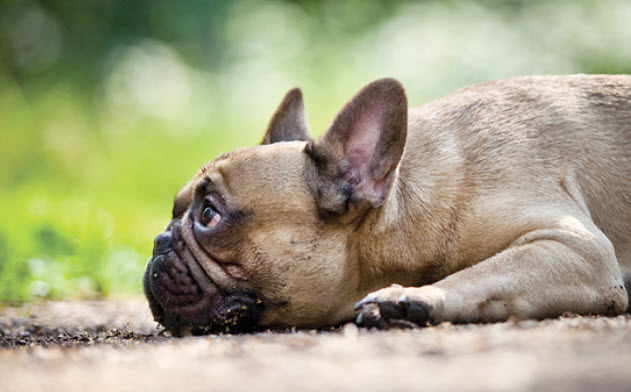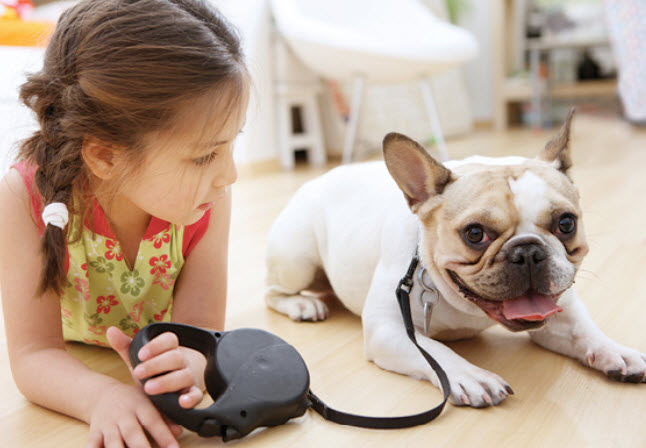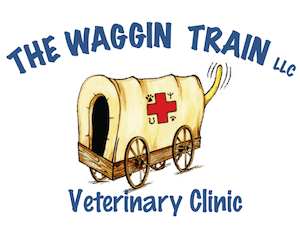
Fantastic Frenchies
The feisty French Bulldog can be a wonderful canine companion. The Frenchie may fit your lifestyle if you're looking for traits like:
- An affectionate companion and family dog
- Even-tempered; adapts to a wide variety of environments
- Small, but sturdy
- Needs minimal exercise
- Quirky, entertaining personality
- Sweet, playful, and friendly
But consider these characteristics, too:
- An indoor dog that doesn’t do well in the heat
- May be territorial when it comes to cats and other dogs
- Exhibits signs of separation anxiety if left alone too much
- Makes a lot of snorting, snuffling, and wheezing noises, and she may snore
- Can be difficult to housetrain
- Willful and stubborn if you don’t show strong leadership
 She is comical, lively, and she thrives on human companionship. Minimal exercise needs and a low barking tendency make her perfect for apartment living.
She is comical, lively, and she thrives on human companionship. Minimal exercise needs and a low barking tendency make her perfect for apartment living.
The French Bulldog descended from the English Bulldog in the 1800’s when it was translocated to France. The breed has flourished as an adored companion ever since. The Frenchie is known for its bat-like ears and short, wrinkled nose. She tends to have a curious and gentle nature and is notorious for being the class clown. She will often have sporadic bouts of energy followed by prolonged periods of resting. She’s loyal and loving and prefers to not be left alone at home. The French Bulldog is a generally healthy breed with an average lifespan of 11-12 years.
Your French Bulldog's Health
We know that because you care so much about your dog, you want to take good care of her. That is why we have summarized the health concerns we will be discussing with you over the life of your French Bulldog. By knowing about health concerns specific to French Bulldogs, we can tailor a preventive health plan to watch for and hopefully prevent some predictable risks.
Many diseases and health conditions are genetic, meaning they are related to your pet’s breed. There is a general consensus among canine genetic researchers and veterinary practitioners that the conditions we’ve described herein have a significant rate of incidence and/or impact in this breed. That does not mean your dog will have these problems; it just means that she is more at risk than other dogs. We will describe the most common issues seen in French Bulldogs to give you an idea of what may come up in her future. Of course, we can’t cover every possibility here, so always check with us if you notice any unusual signs or symptoms.
This guide contains general health information important to all canines as well as the most important genetic predispositions for French Bulldogs. This information helps you and us together plan for your pet’s unique medical needs. At the end of the article, we have also included a description of what you can do at home to keep your Frenchie looking and feeling her best. You will know what to watch for, and we will all feel better knowing that we’re taking the best possible care of your pal.
General Health Information for your French Bulldog
Dental Disease
Dental disease is the most common chronic problem in pets, affecting 80% of all dogs by age two. And unfortunately, your French Bulldog is more likely than other dogs to have problems with her teeth. It starts with tartar build-up on the teeth and progresses to infection of the gums and roots of the teeth. If we don’t prevent or treat dental disease, your buddy will lose her teeth and be in danger of damaging her kidneys, liver, heart, and joints. In fact, your French Bulldog's life span may be cut short by one to three years! We’ll clean your dog’s teeth regularly and let you know what you can do at home to keep those pearly whites clean.
 Infections
Infections
French Bulldogs are susceptible to bacterial and viral infections — the same ones that all dogs can get — such as parvo, rabies, and distemper. Many of these infections are preventable through vaccination, which we will recommend based on the diseases we see in our area, her age, and other factors.
Obesity
Obesity can be a significant health problem in French Bulldogs. It is a serious disease that may cause or worsen joint problems, metabolic and digestive disorders, back pain and heart disease. Though it’s tempting to give your pal food when she looks at you with those soulful eyes, you can “love her to death” with leftover people food and doggie treats. Instead, give her a hug, brush her fur or teeth, play a game with her, or perhaps take her for a walk. She’ll feel better, and so will you!
Parasites
All kinds of worms and bugs can invade your Frenchie's body, inside and out. Everything from fleas and ticks to ear mites can infest her skin and ears. Hookworms, roundworms, heartworms, and whipworms can get into her system in a number of ways: drinking unclean water, walking on contaminated soil, or being bitten by an infected mosquito. Some of these parasites can be transmitted to you or a family member and are a serious concern for everyone. For your canine friend, these parasites can cause pain, discomfort, and even death, so it’s important that we test for them on a regular basis. The Waggin' Train Veterinary Clinic will also recommend preventive medication as necessary to keep her healthy.
Spay or Neuter
One of the best things you can do for your French Bulldog is to have her spayed (neutered for males). In females, this means we surgically remove the ovaries and usually the uterus, and in males, it means we surgically remove the testicles. Spaying or neutering decreases the likelihood of certain types of cancers and eliminates the possibility of your pet becoming pregnant or fathering unwanted puppies. Performing this surgery also gives us a chance, while your pet is under anesthesia, to identify and address some of the diseases your dog is likely to develop. For example, if your pet needs hip X-rays or a puppy tooth extracted, this would be a good time. This is convenient for you and easy for your friend. Routine blood testing prior to surgery also helps us to identify and take precautions for common problems that increase anesthetic or surgical risk. Don’t worry; we’ll discuss the specific problems we will be looking for when the time arrives.
Genetic Predispositions for French Bulldogs
Back Problems
Intervertebral disc disease (IVDD) is a common condition in French Bulldogs. The disease is caused when the jelly-like cushion between one or more vertebrae slips or ruptures, causing the disc to press on the spinal cord. If your dog is suddenly unable or unwilling to jump up, go up stairs, is reluctant to move around, has a hunched back, cries out, or refuses to eat or go potty, he is likely in severe pain. He may even drag his back feet or be suddenly paralyzed and unable to get up or use his back legs. If you see symptoms, don’t wait. Call us or an emergency clinic immediately! For less severe cases, rest and medication may resolve the problem. In many cases involving paralysis, we’ll recommend surgical removal of the ruptured discs (within 24 hours of the onset of symptoms to get the best results). As with so many other diseases, weight control helps to prevent this problem. You should also use ramps or steps from puppyhood on so that your dog doesn’t spend a lifetime stressing his back by jumping on and off of the furniture.
 Spinal Deformities
Spinal Deformities
French Bulldogs are more likely than other canines to be born with spinal deformities (a condition called hemivertebrae), which may lead to spinal cord damage, instability, or disability. We’ll take X-rays when he is young to ensure that we identify problems early because symptoms can worsen with age, weight, and sometimes activity. During his life, if he develops symptoms of any back problems, we’ll rule out any other causes, such as a slipped spinal disc or arthritis and may prescribe medication, acupuncture, or rehabilitation.
Inflammatory Bowel Disease
Inflammatory Bowel Disease or IBD is an immune system disorder common in French Bulldogs in which the intestinal lining becomes overrun with immune system cells called lymphocytes and plasmacytes. The stomach and/or intestinal lining becomes thickened affecting his ability to absorb nutrients properly. Chronic vomiting or diarrhea is common or it may flare up suddenly and then improve again for a time. Stress, diet change, or intestinal parasites may make it worse. If your friend has diarrhea or digestive upsets that are not explained by the more common reasons, diagnostic tests, which may include intestinal biopsy, will be needed. Lifetime medications and special diets are usually required to keep this bellyache under control.
Eye Problems
Not many things have as dramatic an impact on your dog's quality of life as the proper functioning of his eyes. Unfortunately, French Bulldogs can inherit or develop a number of different eye conditions, some of which may cause blindness if not treated right away, and most of which can be extremely painful! We will evaluate his eyes at every examination to look for any signs of concern.
- Cataracts are a common cause of blindness in older French Bulldogs. We’ll watch for the lenses of his eyes to become more opaque—meaning they look cloudy instead of clear—when we examine him. Many dogs adjust well to losing their vision and get along just fine. Surgery to remove cataracts and restore sight may also be an option.
- Distichiasis is a condition caused by extra hairs that grow inside of the eyelid and rub on the surface of the eye. This is one of the most commonly inherited diseases in dogs, and your French Bulldog is more likely than other dogs to develop this painful condition. If untreated, these abnormal hairs can cause corneal ulcers and chronic eye pain. Several treatment options are available, and the prognosis is good once the hairs have been permanently removed.
- Entropion is a condition where the eyelid rolls inward, causing the eyelashes to rub against the cornea (surface of the eyeball). This is an extremely irritating and painful condition that can ultimately lead to blindness. It can happen in any dog breed; however, your French Bulldog is especially at risk for this heritable disorder. Surgical correction is usually successful if performed early.
- Because your Frenchie has eyeballs that naturally protrude, he is more vulnerable to eye injuries. Scrapes or punctures to the cornea (the protective covering on the eyeball) are the most common injuries. Not only do they hurt, they can become infected and affect his vision. Don’t let him ride in the car with his head out the window as this is a frequent cause of eye injuries. Call us at 337-230-9247 right away if he has any problems with his eyes. A damaged cornea is painful and should be treated immediately. Medication and sometimes surgery is required.
Allergies
In humans, an allergy to pollen, mold, or dust makes people sneeze and their eyes itch. In dogs, rather than sneeze, allergies make their skin itchy. We call this skin allergy “atopy”, and French Bulldogs often have it. Commonly, the feet, belly, folds of the skin, and ears are most affected. Symptoms typically start between the ages of one and three and can get worse every year. Licking the paws, rubbing the face, and frequent ear infections are the most common signs. The good news is that there are many treatment options available for this condition.
Bleeding Disorders
There are several types of inherited bleeding disorders which occur in dogs. They range in severity from very mild to very severe. Many times a pet seems normal until a serious injury occurs or surgery is performed, and then severe bleeding can result. Von Willebrand’s disease is a blood clotting disorder frequently found in French Bulldogs. We’ll conduct diagnostic testing for blood clotting time or a specific DNA blood test for Von Willebrand’s disease or other similar disorders to check for this problem before we perform surgery.
Knee Problems
Sometimes your French Bulldog's kneecap (patella) may slip out of place (called patellar luxation). You might notice that he runs along and suddenly picks up a back leg and skips or hops for a few strides. Then he kicks his leg out sideways to pop the kneecap back in place, and he’s fine again. If the problem is mild and involves only one leg, your friend may not require much treatment beyond arthritis medication. When symptoms are severe, surgery may be needed to realign the kneecap to keep it from popping out of place.
Hip and Elbow Dysplasia
Both hips and elbows are at risk for dysplasia, an inherited disease that causes the joints to develop improperly and results in arthritis. Stiffness in your French Bulldog's elbows or hips may become a problem for him, especially as he matures. You may notice that he begins to show lameness in his legs or has difficulty getting up from lying down. We can treat the arthritis—the sooner the better—to minimize discomfort and pain. We’ll take X-rays of your dog’s bones to identify issues as early as possible. Surgery is sometimes a good option in severe and life-limiting cases. Keep in mind that overweight dogs may develop arthritis years earlier than those of normal weight, causing undue pain and suffering!
 Respiratory Distress Syndrome
Respiratory Distress Syndrome
This disease, also known as brachycephalic syndrome, affects dogs with a short nose, like your French Bulldog. He has the same amount of tissue in his nose and throat as the longer-nosed dogs, but there’s no place for it to go. As a consequence, the soft palate (the soft part at the back of the roof of the mouth), is too long and hangs down into the airway. The nostrils are often too small, and sometimes the trachea, or windpipe, is narrow and undersized. All of these things lead to a narrow and obstructed airway. Many of these dogs can barely breathe! Watch for exercise intolerance, loud breathing, coughing, bluish gums, or fainting. With his short nose, he is also more likely to develop other problems, such as flatulence from excessive air intake, pneumonia from aspirating food, or heat stroke. In severe cases, surgical correction may be recommended.
Bladder or Kidney Stones
There are a few different types of stones that can form in the kidney or in the bladder, and French Bulldogs are more likely to develop them than other breeds. We’ll periodically test his urine for telltale signs indicating the presence of kidney and bladder stones; they are painful! If your buddy has blood in his urine, can’t urinate, or is straining to urinate, it is a medical emergency. Call us immediately!
Degenerative Myelopathy
Degenerative Myelopathy is a neurologic condition, similar to ALS or Lou Gehrig's Disease in people, that causes weakness and poor nerve function in the hind legs. It affects French Bulldogs more frequently than other breeds. If your dog has this disease, he will become increasingly weak and disabled in the hind legs and will eventually suffer from paralysis in his hindquarters, along with incontinence. Rehabilitation, exercise, acupuncture, and dietary supplements can be helpful, but there is no cure. A genetic test is available to determine whether your dog is at risk for this heritable disease.
Mange
Demodex is a microscopic mite that lives in the hair follicles of dogs. All dogs have them. Normally a dog’s immune system keeps the mites in check, but some breeds, like your French Bulldog, develop an overabundance of these mites. In mild cases, pet owners may notice a few dry, irritated, hairless lesions. These often occur on the face or feet and may or may not be itchy. Secondary skin infections may occur. Prompt veterinary care is important to keep the disease from getting out of hand. Many pets seem to outgrow the problem, while others require lifelong management.
Skin Infections
Your French Bulldog is prone to a form of skin infection called lip-fold pyoderma, which occurs because the folds of skin along the lower jaw are usually moist. Bacteria and yeast can readily gain a foothold and cause a reddened, smelly area that is uncomfortable for your dog. We will examine him for this problem, but let us know if you see signs. We’ll recommend treatment with antibiotics as necessary. When symptoms are severe, the excess skin folds can be surgically removed.
Taking Care of Your French Bulldog at Home
 Much of what you can do to keep your dog happy and healthy is common sense, just like it is for people. Watch her diet, make sure she gets plenty of exercise, regularly brush her teeth and coat, and call us or a pet emergency hospital when something seems unusual (see “What to Watch For” below). Be sure to adhere to the schedule of examinations and vaccinations that we recommend for her. This is when we’ll give her the necessary “check-ups” and test for diseases and conditions that are common in French Bulldogs. Another very important step in caring for your pet is signing up for pet health insurance. There will certainly be medical tests and procedures she will need throughout her life and pet health insurance will help you cover those costs.
Much of what you can do to keep your dog happy and healthy is common sense, just like it is for people. Watch her diet, make sure she gets plenty of exercise, regularly brush her teeth and coat, and call us or a pet emergency hospital when something seems unusual (see “What to Watch For” below). Be sure to adhere to the schedule of examinations and vaccinations that we recommend for her. This is when we’ll give her the necessary “check-ups” and test for diseases and conditions that are common in French Bulldogs. Another very important step in caring for your pet is signing up for pet health insurance. There will certainly be medical tests and procedures she will need throughout her life and pet health insurance will help you cover those costs.
Routine Care, Diet, and Exercise
Build her routine care into your schedule to help your Frenchie live longer, stay healthier, and be happier during her lifetime. We cannot overemphasize the importance of a proper diet and exercise routine.
- Supervise your pet as you would a toddler. Keep doors closed, pick up after yourself, and block off rooms as necessary. This will keep her out of trouble and away from objects she shouldn’t put in her mouth.
- She has low grooming needs. Brush her coat as needed, at least weekly.
- French Bulldogs often have serious problems with their teeth, so you’ll need to brush them at least three times a week!
- Clean her ears weekly, even as a puppy. Don’t worry—we’ll show you how!
- Check her facial wrinkles and eyes often. Her droopy skin and eyes can collect debris.
- She is well suited for apartment living; she will need a daily walk and regular inside play.
- She can be sensitive to warm temperatures; avoid any prolonged exposure and be very alert to the signs of heat stress.
- Keep your dog’s diet consistent and don’t give her people food.
- Feed a high-quality diet appropriate for her age.
- Exercise your dog regularly, but don’t overdo it at first.
What to Watch For
Any abnormal symptom could be a sign of serious disease, or it could just be a minor or temporary problem. The important thing is to be able to tell when to seek veterinary help, and how urgently. Many diseases cause dogs to have a characteristic combination of symptoms, which together can be a clear signal that your French Bulldog needs help.
Office Calls
Give us a call for an appointment if you notice any of these types of signs:
- Change in appetite or water consumption
- Tartar build-up, bad breath, red gums, or broken teeth
- Itchy skin (scratching, chewing, or licking), hair loss
- Lethargy, mental dullness, or excessive sleeping
- Fearfulness, aggression, or other behavioral changes
- Dry, scaly, sometimes itchy hairless patches on face or paws
Emergencies
Seek medical care immediately if you notice any of these types of signs:
- Scratching or shaking the head, tender ears, or ear discharge
- Inability or straining to urinate; discolored urine
- Cloudiness, redness, itching, or any other abnormality involving the eyes
- General reluctance to run or play
- Loud breathing, tires easily at exercise
- Dragging the hind toes and hind limb weakness
- Leg stiffness, reluctance to rise, sit, use stairs, run, jump, or “bunny hopping”

